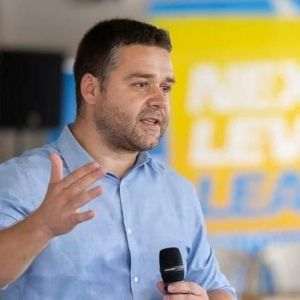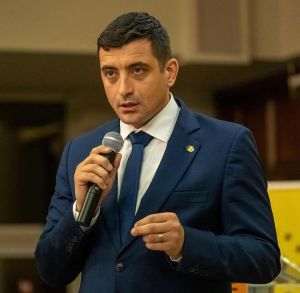• (Interview with Cosmin Ghiţă, CEO of Nuclearelectrica)
• "Nuclear energy comes with advantages that are impossible to ignore or minimize and can have a reversible effect on global warming"
• "Our goal is to remain by the end of the year aligned with the budgeted results"
• "By introducing Cobalt 60 in the Cernavodă reactors, SNN has the potential to become an important player in ensuring the supply of Co-60 within the EU"
Nuclearelectrica, the operator of CNE Cernavodă, has scheduled investments of 2.29 billion lei by 2025, and in order to draw the objectives it is considering the drawing of funding from the stock market, said Cosmin Ghiţă, the company's CEO.
The head of the state-owned company told us the following: "We will certainly exploit the new opportunities (brought by the promotion of the company in the FTSE Russell indices for the emerging markets): the accessing of a new market, the tapping of the stock market instruments at the right time for the investment projects. (...) It is still premature for a decision in that regard concerning the exploitation of the stock market opportunities for various investment projects, but once we have a clear financing structure, we will also include the stock market instruments side". He says that Nuclearelectrica has completely adapted to the situation created by the pandemic and that despite the drop in demand and the energy prices in the first semester, the financial results are within the budget. "Our goal is to remain until the end of the year in line with the budget ed results", Ghiţă said.
The retooling of Unit 1, the detritification installation, the production of Cobalt 60 and the expansion of the nuclear capacity are challenges in themselves, are, within the best meaning of the world, meant to streamline costs and bring in additional revenues, said Cosmin Ghiţă, who added that, through the manufacturing of Cobalt 60 in the Cernavodă reactors, the company has the potential to become an important player in supplying Co-60 within the EU.
Reporter: How has the company adapted to the new economic context, caused by the Covid-19 pandemic?
Cosmin Ghiţă: We are currently fully adapted. Sure, there are many changes compared to the manner of working of 2019, but these are a necessity to preserve both people's health, as well as the continuity of activities. We have plans implemented, procedures, measures which would ensure this continuity and avoid as much as possible my colleagues getting sick. We have devised them and organized them logistically from the beginning, for any scenario, we have never interrupted them, so that if we have a temporary increase in the number of cases caused by the community spread we can act rapidly to avoid contamination.
The adopted measures do not impact in any way the normal unfolding of operations, the company is operating absolutely normally.
There has been from the beginning and throughout this pandemic period an extraordinary cooperation between people in the company, with each of them understanding the role, the responsibilities and the importance of adapting to the new manner of working: whether we are talking about isolation, as has been the case with the operating personnel, teleworking, rotation, the strict compliance with hygiene measures.
We ensure the periodic testing of employees and it has been absolutely necessary to ensure all the logistic from that point of view, so that we can quickly answer to the people and the company's needs. Our logic has been: without protecting people we can't ensure the protection of the company's processes.
Reporter: After the first quarter you have reported a profit increase of 18%, despite the drop in demand and the energy prices due to the Covid-19 crisis, but also due to the fact that the maintenance in Unit 1 has been launched towards the beginning of June. How has demand evolved on the energy market and what are your income prospects for this second semester?
Cosmin Ghiţă: The postponement of the planned shutdown of Unit 1 was a measure that was absolutely necessary at the time. We are not the only ones in the international industry who have decided to act like that. Planned stops are basically complex investment projects, which involve a lot of work on the ground, implicitly people and interactions between them.
To go back to your question, the financial results are in line with those of the budget and our goal is to remain until the end of the year in line with our forecasted results. Since we are a listed company, I need to follow the dates for publishing the financial statements, therefore, at this time I am unable to give you more information on the results of the third quarter of 2020 or about the ones for the year 2020. Sure that in all this period, the energy market had its fluctuations. We have seen, and that was not the case just in Romania, an explicable drop, in the context of COVID, in consumption and prices. And we have also borne the impact of the reintroduction of the regulated market, through that obligation of 2019 to maintain up to 65% of the production for the regulated segment. After the issuing of the Decision by the ANRE on the quantity that would be sold by SNN on the regulated market, as well as the price thereof, we had to also sell the remaining volume of energy up to 65%. That is why the presence of SNN on the spot market was a lot greater in the first quarter of this year, compared to the previous years. We prefer the forward market for stability and predictability. But with the liberalization of the market, that aspect will be eliminated.
I will come back to what I was saying and support the importance of any sudden regulations, such as the return to the regulated market, which can affect some producers, their strategy and their investments. We have thus seen that such a regulatory context can overlap with the COVID context, thus, the two of them together becoming a challenge.
Reporter: What are the biggest challenges for Nuclearelectrica, in the short, medium and long term? Also, starting from January 1st, the energy market is going to be completely liberalized. Nuclearelectrica has sold almost 20% of the energy sold on the regulated market. In your view, as a producer, what does a liberalized market for electriciy mean and what are the advantages and disadvantages of such a market?
Cosmin Ghiţă: I will continue the answer to the previous question: the energy market can be a challenge, due to a multitude of internal and external factors: consumption, economic growth, the fluctuations of the price of raw materials, energy policies, regulations. In terms of regulations and recent experience, a liberalized market invariably has major advantages: the first, with a direct impact on the stability and predictability of SNN, the producers' and suppliers' ability to make their own commercial strategies that lead to the sustainability of affairs over long periods of time and the openness to innovation for improving the services or the quality of the products provided; the increase in competitiveness at the end consumers - with a direct effect on streamlining suppliers' costs and optimizing their energy purchases through contracts with various products; forcing producers and suppliers to streamline costs to be competitive, with a direct positive impact on the national economy by increasing the investment in new capabilities and/or in increasing the efficiency of old equipment/capabilities; the increase in the liquidity of the competitive bulk market which can provide a greater stability of the price provided to the national industry, thus ensuring a healthier long term development for it, as well as the regional competitiveness of the national economy; stimulating the reduction of carbon emissions by motivating household consumers to install photovoltaic panels and batteries, which would also reduce the impact on the balancing market, as well as on the stability of the energy system/the flattening of the consumption curve.
SNN is par excellence a market participant, not a market maker, that is why I am an advocate of maintaining the market's real competitiveness.
Other than that, we have concrete plans and investment projects, which we will certainly complete: the retooling of Unit 1, the detritification installation, the production of Cobalt 60, the expansion of the nuclear capability. Some of them, the detritification installation and the production of Cobalt 60, are challenges in themselves, within the best meaning of the term, due to their complexity and novelty. They are also meant to streamline costs and bring in additional revenues.
Reporter: Your company is one of those which have contributed to the secondary emerging market status. What is your opinion on this upgrade and what does it mean for Nuclearelectrica? Do you intend to raise funding from the stock market, now that the company has been included in the FTSE Russell indices for the emerging markets? What instruments are you considering, what amounts, and which investors are you in talks with?
Cosmin Ghiţă: It means a lot for SNN. It is an upgrade which comes at the right time.
It means a lot to SNN. It's an upgrade that comes at the right time. Even before, we intended to tap the stock market for the SNN investment projects and we worked to have as good a positioning and perception on the stock market as possible: financial results, future investment projects, good returns for shareholders, corporate governance and investor relations. It is a combination of factors which we have increased constantly and the inclusion in the emerging market indices of FTSE Russell came somewhat naturally.
We will definitely seize the new opportunities: accessing a new market, the exploiting of the stock market instruments at the right time for the investment projects. At the same time, we will continue to at least have stability.
It is still premature for a decision at this time related to capitalizing the stock market opportunities for various investment projects, but once we have a clear financing structure, we will also include the capital market tools part.
Reporter: Based on our information, work has begun at the Ministry of the Economy and Energy on a CFD mechanism (in a contract with the EBRD). Are your experts involved or are you interested in getting involved drawing up that mechanism? Also, please explain to us why that mechanism is so important for Nuclearelectrica's investments?
Cosmin Ghiţă: Such a support financing mechanism is beneficial for investments in several sources, not just nuclear. Initially, it was devised internationally as a mechanism for renewables. The nuclear industry subsequently saw its potential, and currently, the Contract for Difference, is actually implemented in the UK's nuclear project at Hinkley Point C.
Even in the case of nuclear technologies which are considered mature (such as Candu 6, the technology used at CNE Cernavodă), the investment, like any other investment, essentially boils down to the profitability rate. Thus, there is a need for an emphasis on the financial aspects, and that thing can be achieved through such a mechanism like the contract for difference. The implementation of such a mechanism can make the difference between investments in new capabilities made on time and the lack of such investments. I repeat, it is useful for several types of investments, not just those in the nuclear industry. When it comes to nuclear, construction involves major costs, but long term operation is profitable.
The contract for difference is essentially a financial mechanism which follows he market prices, which doesn't overcompensate, does not guarantee a discretionary profit and includes risks pertaining to any mechanism based on market data: it is a dual financing mechanism set as the difference between the level of the energy price guaranteed to the producer (strike price) and the reference price; the energy price guaranteed to the producer reflects the costs of the investment and allow a reasonable profit margin; includes periodical analyses to decrease the guaranteed price level if the costs prove to be lower than planned, thus avoids over-compensation; it involves the direct sale of energy, thus exposing the producer to the inherent market risks (does not guarantee the purchasing of the output) and thus requires them to evaluate and control the base risk in order to reach the established price levels; reduces borrowing costs, due to the decrease in the risk of the business, which has positive effects on the price of energy; stipulates contractual protection against legislative changes and energy policy changes, thus controlling the risk of deficient regulations; it allows, via implementation, the creation of a fair competitive framework for all energy sources with low CO2 emissions; does not guarantee a fixed income level, per total, nor a fixed profit level.
Therefore, a supporting financial mechanism, which comes with many advantages, even with a corrective role in some market situations..
Reporter: Do you still intend to acquire the assets of CNU Feldioara?
Cosmin Ghiţă: Being a listed company, the supreme decision-making forum is the Generl Shareholder Meeting, and its decisions are actions and measures for every approved project, whether we are talking about the takeover of Feldioara or expanding capacity or retooling.
Regarding the takeover by SNN of the CNU branch, Feldioara, there is a Decision of the SNN shareholders in this respect. The takeover is based on a complex analysis, which is currently in full swing, so that, overall, the project will lead to the creation of synergies with the other major activities of SNN.
Reporter: What is the status of the Cobalt 60 production project, the isotope used in radiation therapy to treat cancer? But would the detritification plant project, which, would, among other things, reduce staff exposure to tritium, cut downtime for maintenance and refurbishment, and also reduce associated costs? Can you tell us when do you plan to sign that Engineering Procurement Construction (EPC) contract for that facility and whether you have received any offers so far?
Cosmin Ghiţă: Cobalt 60 is a gamma-radioactive isotope that is efficiently obtained in nuclear reactors by irradiating bars containing Co-59. This radioactive isotope is widely used in medicine, the sterilizing a diverse range of medical instruments, pharmaceuticals, cosmetics and food. There are also other applications of Co-60 in the treatment of certain plastics or sewage waste.
The production of Co-60 in the reactors at the Cernavodă NPP is a business opportunity and a benefit for the medical world. Moreover, SNN has the potential to become an important player in ensuring the supply of Co-60 within the European Union.
The project is structured in three phases: Phase 1, the one we are currently in, involves conducting preliminary studies and the pre-feasibility study. Also in phase 1, a cost estimate will be made for the subsequent phases. Phase 2 includes the part of pre-engineering / engineering studies, feasibility (including corporate approvals) and obtaining CNCAN approvals, and Phase 3 means Project Design and Implementation, estimated to take place in the 2022-2027 period. It may seem like a relatively long time, but the implementation of the project can only be done during the planned shutdowns.
The Detritification Plant will ensure the removal of tritium from heavy water and keep its concentration as low as possible. The detritification of the heavy water from the moderator and from the primary circuit will allow cutting radiation protection costs for the personnel with a direct impact on the economy of the projects. The project developed by SNN, based on the Romanian technology provided by ICSI Rm. Vâlcea, (has) a cost of 190 million euros, of which 150 million euros will be financed by an EBRD loan.
The benefits of this investment are complex: reducing operational costs by significantly reducing the need for radiation protection materials; reducing costs with waste management, the exploitation of tritium. The project implementation strategy is based on concluding an EPC (Engineering Procurement Construction) contract with an economic operator or an association with experience in achieving such objectives, selected on the basis of a competitive bidding procedure, according to the law. The contract is estimated to be awarded in 2021.
Reporter: What is the current stage of the projects for reactors 3 and 4? What investors are you talking to and what is the strategy for carrying out this project that is very important for the national energy system? Economy Minister Virgil Popescu said that the construction of a single reactor, by the company itself, is also being considered - do you think it can be done?
Cosmin Ghiţă: As I told you earlier, SNN acts strictly on the basis of the Shareholders' Decision of June 2020, having a mandate to analyze and crystallize the options for achieving that project. When this approach is completed, as it is currently in the process of being implemented, we will submit it to the shareholders for approval, in accordance with stock market regulations.
Reporter: What amounts does SNN plan to invest over the next ten years? What is the amount of the investment estimated for the construction of reactors 3 and 4 or of a reactor built by SNN itself?
Cosmin Ghiţă: We have an investment strategy that has been made public, until 2025. That doesn't mean investments won't continue past 2025, but it is currently difficult to have clear data past 2025 given the stages of some projects. Furthermore, for the retooling and Cobalt 60 projects we are at the stage of technical analyses, and the feasibility study can only be done following the completion of these studies. Much of the information obtained via the analysis processes will be the foundation for the feasibility studies, or for the clear and irrevocable structuring of funding. These stages are connected.
The total amount of investment projects of the Investment Strategy of SNN, by 2025, is 2.29 billion lei.
Reporter: How do you see the future of nuclear energy in the context of the Green Deal?
Cosmin Ghiţă: Although nuclear energy has not been mentioned in the Green Deal as part of the EU's future decarbonisation energy mix, the environmental targets set by Member States - emission neutrality by 2050 - certainly cannot be achieved without the contribution of nuclear energy. The European Commission's address "A clean planet for all", of November 2018, states that "by 2050, more than 80% of EU energy will come from renewable energy. Together with nuclear energy with a percentage of about 15% , these sources will form the backbone of a European carbon - free energy system". The October 2018 IPCC report "Global Warming of 1.5EC" recognizes the key role of nuclear energy in keeping global warming below 1.5 EC.
Nuclear power comes with some advantages that are impossible to ignore or diminish. Beyond the direct effect on the costs and pace of decarbonization, it has environmental, social and economic benefits:
- Cutting greenhouse gas emissions: in the EU, nuclear energy has contributed to avoiding the release of 20 Gt CO2 in the last 50 years. In Romania, since the commissioning of Units 1 and 2, the release of 170 million tons of CO2 has been avoided. Nuclear power can have a reversible effect on global warming, given that energy demand is projected to increase. During the nuclear fuel cycle, nuclear power plants have very low greenhouse gas emissions compared to other energy production sources.
Also, the land area required for nuclear power plants is significantly smaller than for other sources. The volume of high-risk waste is also much lower than in other sources of in-band energy production and the nuclear sector is the only one that manages the final costs of waste storage and decommissioning of plants while they are operational, which also happens in Romania;
Job creation and maintenance: EU nuclear energy creates 1.1 million jobs and generates annual revenues of euro 507 billion in GDP. It is estimated that these figures will increase in the context of programs to extend the life of existing nuclear units, but also as a result of research and innovation in the nuclear field, by commissioning small modular reactors, 4th generation reactors, nuclear fusion, other applications of nuclear energy. In Romania, the nuclear sector provides 11,000 jobs, a number that could increase to 19,000 in the context of starting new nuclear projects, generating a turnover of 590 million euros;
- Contribution to electrification: Nuclear energy is a source with band production, being independent of meteorological instabilities and having sufficient primary resources for sustainable operation. It is estimated that the identified uranium resources globally are sufficient to power existing nuclear power plants as well as to stimulate the construction of new nuclear power plants for a period longer than 120 years. Nuclear power plants can also operate in a flexible, hybrid model, in combination with renewable resources;
- Innovation potential: Nuclear technology offers long term prospects for growth through the implementation of small modular reactors (SMR) and advanced four generation reactors which Romania is also interested in. Nuclear energy can be used for producing clean hydrogen, a key element for the decarbonification of other industrial sectors, such as transportation, homes, the heating of cities, and seawater desalination - such projects have been successfully implemented globally. In Romania, the nuclear plant of Cernavodă provides heating for over 60% of the residents of Cernavodă.
To conclude, we cannot talk about decarbonisation, about keeping its costs within acceptable margins, achieving the set targets or meeting the needs of consumption in the new energy mix without nuclear energy.
Reporter: Thank you!
























































